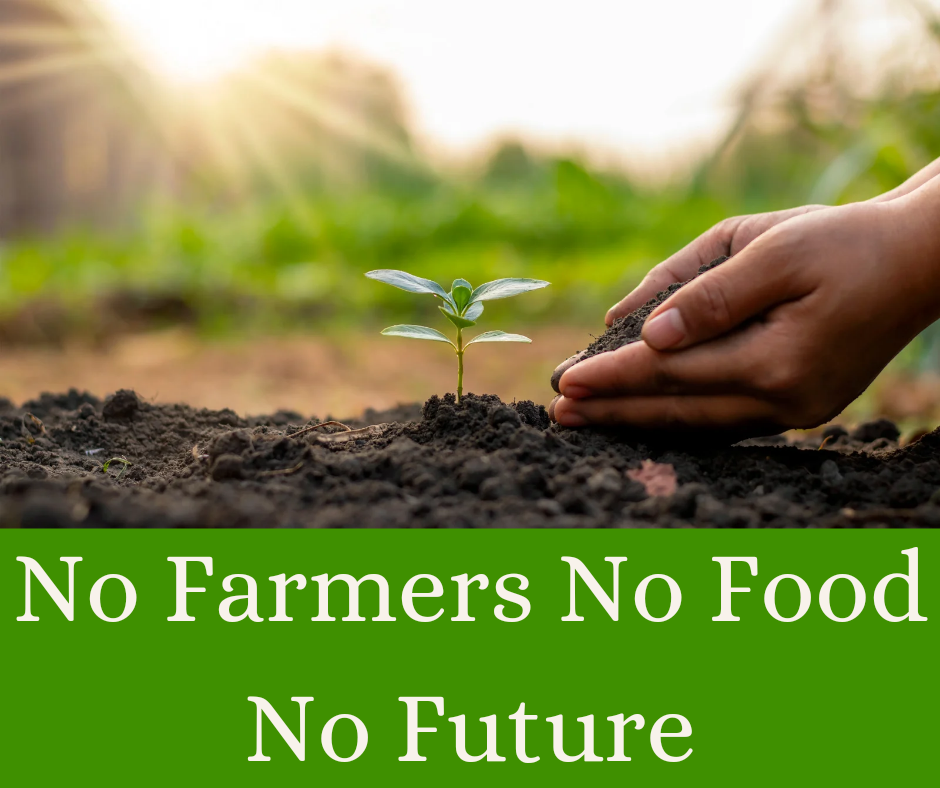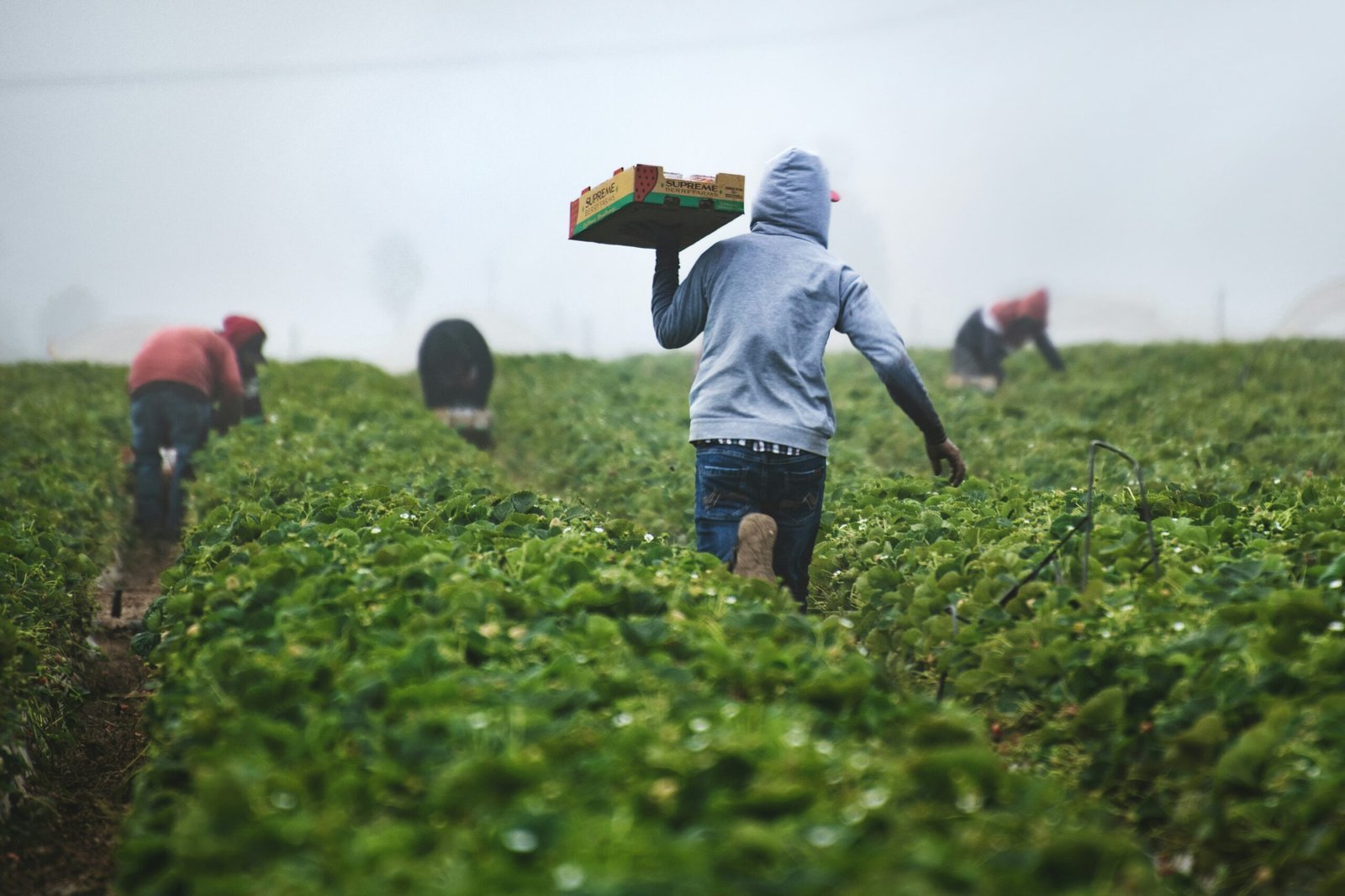No Farmers, No Food, No Future

In the tapestry of human civilization, agriculture stands as the foundation upon which societies have flourished for millennia. Yet, in the fast-paced modern era, the significance of agriculture can sometimes be overlooked. The simple truth remains: without farmers, there would be no food. In this blog post, we delve into the profound importance of agriculture, the challenges faced by farmers today, and the imperative of securing a sustainable future for food production.
The Vital Importance of Agriculture:
At its core, agriculture is not merely about planting seeds and harvesting crops; it embodies a complex interplay of traditions, knowledge, and practices that sustain human life. From ancient civilizations to contemporary societies, agriculture has been the bedrock of human survival and advancement.
First and foremost, agriculture fulfills the most basic human need: nourishment. Through the cultivation of crops and the raising of livestock, farmers provide the sustenance upon which all life depends. From grains like wheat and rice to fruits, vegetables, and proteins, agriculture encompasses the diverse array of foods that sustain our bodies and fuel our activities.
Beyond sustenance, agriculture plays a pivotal role in economic stability and prosperity. The agricultural sector serves as a cornerstone of economies worldwide, providing livelihoods for millions and driving economic growth through trade and commerce. Moreover, agriculture fosters rural development, supporting vibrant communities and cultural heritage.
Furthermore, agriculture is intricately intertwined with environmental sustainability. Sustainable farming practices promote soil health, conserve water resources, and mitigate climate change. By stewarding the land and adopting eco-friendly practices, farmers ensure the long-term viability of food production while safeguarding ecosystems for future generations.
Challenges Facing Farmers:
Despite its critical importance, agriculture faces an array of challenges in the contemporary world. Climate change poses a formidable threat, with shifting weather patterns and extreme events disrupting agricultural ecosystems and threatening food security. Farmers must grapple with the unpredictable impacts of climate change on crop yields, water availability, and pest outbreaks.
Moreover, the loss of arable land to urbanization, deforestation, and soil degradation exacerbates the challenge of feeding a growing global population. As urban areas expand and natural habitats diminish, the pressure on existing farmland intensifies, leading to unsustainable practices and land degradation.
Additionally, farmers confront economic uncertainties such as fluctuating market prices, rising input costs, and limited access to markets. Small-scale farmers, in particular, face formidable barriers to accessing markets and resources, jeopardizing their livelihoods and exacerbating rural poverty.
Securing a Sustainable Future for Agriculture:
In the face of these challenges, securing a sustainable future for agriculture requires concerted action and innovation. Embracing sustainable farming practices, such as conservation agriculture, agroforestry, and organic farming, can enhance resilience to climate change while preserving natural resources.
Investments in agricultural research and development are paramount to driving innovation and productivity growth in agriculture. By harnessing cutting-edge technologies and scientific advancements, farmers can boost yields, improve food quality, and mitigate environmental impacts.
Furthermore, fostering partnerships and collaboration among governments, NGOs, and the private sector is essential for supporting farmers and promoting sustainable agriculture. Policies that incentivize sustainable practices, expand access to markets, and invest in rural infrastructure can bolster resilience and enhance food security.
Empowering small-scale farmers, particularly women, through access to resources, training, and market opportunities is crucial for fostering inclusive growth and reducing poverty. By strengthening farmer cooperatives, providing financial support, and promoting gender-sensitive policies, we can ensure that all farmers have the tools and resources they need to thrive.
Conclusion:
“No farmers No food No future.” This simple yet profound mantra encapsulates the essence of agriculture’s indispensable role in our world. As we navigate the complexities of the 21st century, safeguarding the future of agriculture is paramount to ensuring food security, economic prosperity, and environmental sustainability for generations to come. By embracing innovation, fostering collaboration, and empowering farmers, we can pave the way for a brighter, more sustainable future where no one goes hungry.

Frequently Asked Questions
1. Why is the phrase “No Farmers, No Food, No Future” important?
The phrase “No Farmers No Food No Future” emphasizes the crucial role that farmers play in ensuring food security and the sustainability of our future. It highlights the interdependence between farmers, food production, and the well-being of society as a whole.
2. What does “No Farmers No Food No Future” mean?
“No Farmers No Food No Future” is a simple yet powerful statement that underscores the importance of farmers in our society. It conveys the message that without the dedicated efforts of farmers, we would not have enough food to sustain our growing population, and our future would be at risk.
3. Why are farmers so important?
Farmers are the backbone of our food system. They are responsible for cultivating crops, raising livestock, and producing the food that sustains us. Without farmers, there would be a significant shortage of food, leading to hunger, malnutrition, and a decline in public health.
4. How do farmers contribute to food security?
Farmers play a critical role in ensuring food security by producing a steady supply of nutritious food. They work tirelessly to plant, nurture, and harvest crops, as well as raise livestock for meat, dairy, and eggs. Their efforts help meet the dietary needs of individuals and communities, reducing the risk of hunger and malnutrition.
5. What challenges do farmers face?
Farmers face numerous challenges in their profession. These include unpredictable weather patterns, pests and diseases that can damage crops and livestock, fluctuating market prices, access to resources such as land and water, and the need to adopt sustainable farming practices to protect the environment. Additionally, farmers often work long hours in physically demanding conditions.
6. How can we support farmers?
There are several ways we can support farmers and ensure their continued success:
- Buy locally produced food to support small-scale farmers and reduce the environmental impact of long-distance transportation.
- Choose organic or sustainably grown products to encourage environmentally friendly farming practices.
- Advocate for fair trade policies that prioritize the well-being of farmers and promote equitable trading relationships.
- Support initiatives that provide farmers with access to resources, such as land, water, credit, and education.
- Get involved in community-supported agriculture programs or farmers’ markets to directly support local farmers.
7. How can we raise awareness about the importance of farmers?
Raising awareness about the importance of farmers is crucial for promoting a sustainable and secure food system. Here are some ways to raise awareness:
- Share information about the challenges faced by farmers and the importance of supporting local agriculture through social media, blogs, or community events.
- Organize educational workshops or seminars to educate others about the role of farmers in food production and the impact of their work on our daily lives.
- Support organizations and initiatives that advocate for the rights and well-being of farmers.
- Engage in conversations with friends, family, and colleagues about the importance of supporting farmers and sustainable farming practices.
8. How can we encourage the next generation to become farmers?
Encouraging the next generation to become farmers is essential for the continuity of our food system. Here are some ways to inspire young people to pursue a career in farming:
- Provide educational opportunities that highlight the diverse career paths available in agriculture, such as agribusiness, sustainable farming, and agricultural technology.
- Support agricultural programs in schools and universities to provide hands-on learning experiences and mentorship opportunities.
- Offer financial incentives, such as scholarships or grants, for students pursuing agricultural studies.
- Promote the benefits and rewards of farming, such as the opportunity to work outdoors, contribute to food security, and make a positive impact on the environment.
9. What can individuals do to reduce the impact of agriculture on the environment?
Individuals can play a role in reducing the impact of agriculture on the environment by making conscious choices:
- Choose plant-based or vegetarian options to reduce the demand for meat and the environmental impact of livestock farming.
- Minimize food waste by planning meals, composting organic waste, and supporting initiatives that redistribute surplus food to those in need.
- Conserve water by practicing responsible water usage at home and supporting farmers who employ efficient irrigation methods.
- Support regenerative agriculture practices that focus on soil health, biodiversity, and reducing the use of synthetic inputs.
- Reduce reliance on single-use plastics by choosing reusable bags, containers, and utensils.
10. How can we ensure a sustainable future for farmers and food production?
Ensuring a sustainable future for farmers and food production requires collective action and long-term planning. Here are some key strategies:
- Invest in research and development to improve farming techniques, crop varieties, and livestock management practices.
- Support policies that promote sustainable agriculture, such as subsidies for environmentally friendly practices and regulations to protect farmers’ rights.
- Encourage collaboration between farmers, scientists, and policymakers to develop innovative solutions for the challenges facing agriculture.
- Promote sustainable consumption patterns and reduce food waste to minimize the strain on agricultural resources.
- Recognize and value the contributions of farmers by providing fair prices for their products and ensuring their access to essential resources.
Disclaimer:
The views expressed in this blog post are those of the author and do not necessarily reflect the opinions or policies of any organization mentioned. The information provided is for general informational purposes only and should not be construed as professional advice. Readers are encouraged to seek independent advice and conduct their own research before making any decisions based on the content of this blog post.
Subscribe to stay informed! Join our community and never miss out on the latest updates, insights, and tips. Be the first to receive exclusive content, special offers, and exciting news delivered straight to your inbox. Don’t miss your chance to be part of the conversation and stay ahead in your field. Subscribe now and stay connected!
Feel free to share your thoughts and experiences in the comments section below. We look forward to hearing from you!

